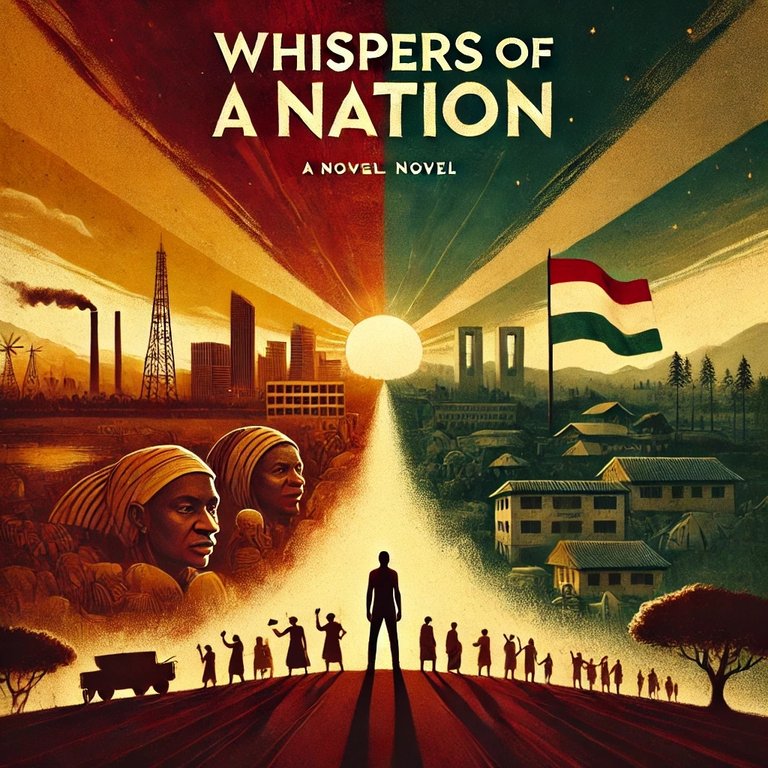The sky above the village had a strange tint that afternoon, neither the brilliant blue of a peaceful day nor the stormy grey that warned of approaching rain. It hung somewhere in between, mirroring the uncertainty that gripped the nation. A hush had settled over the community, the kind of silence that made even the birds think twice about singing. The marketplace, usually bustling with noise, was eerily still.
Ngozi Chimezie, now a woman worn by the events of the past few months, walked slowly through the village square. Her steps were heavier now, not just with age but with the weight of all she had seen. She glanced at the people around her—vendors sitting idly by their goods, children playing half-heartedly in the dirt, and elders whispering to each other in tones too low to carry.
“What has happened to us?” she muttered to herself.
As she made her way to the old baobab tree, she spotted Suleiman sitting under it, his tattered cap in his hands staring at the ground. The school had been closed for weeks, and his once lively spirit seemed dimmed by the events around him. The insurgency that had ravaged their land was not over, but the village had reached a strange plateau—where the threat of violence was always there, yet no one dared to speak of it anymore.
“Still no children?” Ngozi asked as she approached him.
Suleiman looked up slowly, his deep-set eyes revealing a man who had seen far too much. “No. And I doubt they’ll return anytime soon,” he replied with a sigh.
Ngozi sat down beside him, both of them facing the dusty road that led out of the village. “It wasn’t always like this,” she said, her voice barely above a whisper. “I remember when this square was full of life. Now, it feels like even the wind has stopped coming here.”
Suleiman nodded, rubbing his calloused hands together. “The wind, the children, hope... they’ve all disappeared.”
They sat in silence for a while, the air between them heavy with unspoken words. Finally, Suleiman broke the silence.
“The nation whispers to us, Ngozi,” he said, his voice low but steady. “But do you hear it?”
Ngozi turned to him, frowning. “What do you mean?”
“The whispers,” Suleiman continued. “Of the past, of the future, of everything in between. They’re quiet now, but they’re still there, in the silence, in the empty classrooms, in the streets that no longer echo with laughter.”

Ngozi sighed deeply. “I hear them too, Suleiman. Every day. It’s as if the soul of this nation is trying to tell us something, but we’re too afraid to listen.”
They fell silent again, the weight of Suleiman’s words settling over them like the dust that clung to the trees and buildings. The nation’s whispers were growing louder, yet the people had grown numb, too accustomed to the chaos, the loss, the fear.
Just then, the sound of footsteps approached, breaking the stillness. Ngozi and Suleiman turned to see Aisha walking toward them, her face a mixture of determination and weariness.
“Aisha,” Ngozi greeted her warmly. “You’re late today.”
Aisha shook her head, a faint smile playing on her lips. “I had some things to take care of. But I came as soon as I could.”
Suleiman stood up, dusting off his trousers. “And what news do you bring us today, Aisha? More whispers?”
Aisha chuckled softly, though her eyes remained serious. “I suppose you could say that. But these are whispers of action, not just words.”
Ngozi raised an eyebrow. “Action? What do you mean?”
Aisha crossed her arms, glancing between the two of them. “I’ve been talking to some of the villagers. The women mostly. We’re tired of sitting here, waiting for something to happen. We want to rebuild. If the children won’t come to school, then we’ll bring the school to them. In their homes, in their yards. Wherever they are, we’ll teach them.”
Suleiman blinked, surprised by her boldness. “You want to take the school to them?”
Aisha nodded firmly. “Why not? We’ve waited long enough for change to come to us. It’s time we go to it.”
Ngozi felt a flicker of hope stir within her chest. She looked at Aisha, her eyes searching the younger woman’s face for any sign of doubt. But there was none. Aisha had always been determined, stubborn, and even, but this was different. This was resolved.
“The whispers are telling us to move,” Aisha continued, her voice growing stronger. “We can’t let fear hold us back anymore. If we want a future for our children, for our nation, we have to fight for it in our own way.”
Suleiman exchanged a glance with Ngozi. “What do you think?”
Ngozi smiled faintly, the first genuine smile she had felt in weeks. “I think she’s right.”
The three of them stood together under the baobab tree, the village around them still and silent. But in that silence, something new was stirring—something more powerful than fear. Hope. Not the naive hope of their youth, but the kind that came from struggle, from loss, and from the determination to keep going no matter what.
“We start tomorrow,” Aisha said, her eyes bright with purpose. “Are you with me?”
Ngozi and Suleiman nodded in unison, a quiet but firm agreement. Tomorrow, they would begin again. And maybe, just maybe, the whispers of the nation would finally turn into a roar.
As the sun set behind them, casting long shadows across the village, the silence no longer felt oppressive. It felt like a beginning.
End of Chapter Thirty-One